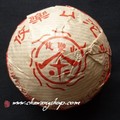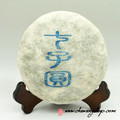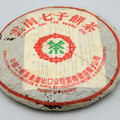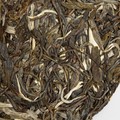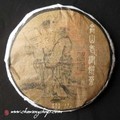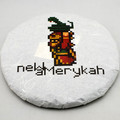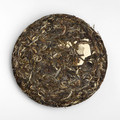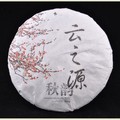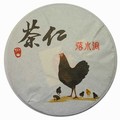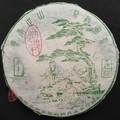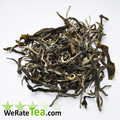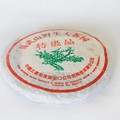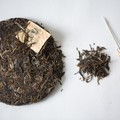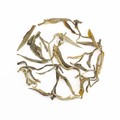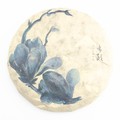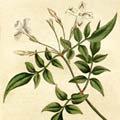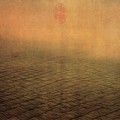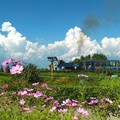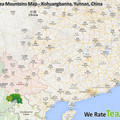Sheng - Raw Puerh - 3 and more stars
Tea by type
Tea by region
Tea by years and other
2009 Youleshan Tuo Cha Raw 100g
 1 review, 1 comment
1 review, 1 commentThis tuo is made of wild arbor sun-dried material from Youle mountain, also called Jinuoshan, Youle is one of the Six Famous Tea Mountains in Xishuanbanna. Spring Youle mountain material pressed to tuo shape. Stored in Banna for 4 years (- very good storage without bad signs of mold or other negative strangeness make the tea taste terrible!) and mature faster than in dry Kunming storage. Nice golden clean tea soup with hint of honey, smooth and mellow in mouth, ripe fruit and...
2012 Bulang Man Xin Long Wild Arbor Raw Puerh Cake 250g
 1 review
1 reviewProduct name (stamp on the wrapper) : Qi Zi Yuan This cake come from natural growing tea garden in Man Xin Long, Bulang mountain. This tea is powerfull with nice aroma, full and strong, bitter with fast huigan and very good energy. Great for long term aging! This cake is in limited quantity
2000 CNNP 7532 Tiepai
 1 review
1 reviewThis tea most closely resembles CNNP 7532, but we are labeling it as tiepai [pasted brand] because it is too difficult to pinpoint the exact origins of the cake and we do not want to misrepresent it. Stored in Guangdong province, this tea has a slight humidity to it, but the cakes and tea are very clean. Some cakes have a neifei [inner ticket] buried in the middle of the cake, some are on the surface, and one cake we opened did not have a neifei.
Lao ManE 2013 autumn
 1 review
1 reviewThe LaoManE rules over this autumn teas. In this village you may find really bitter tea and also sweet teas as the villagers call it. This one is something from the first and second too, very balanced and drinkable from it's very fresh state. Masterly picked and made maocha makes a great tea, made by a very skillfull and modest buddhist monk. A tea that comes with its sharp edge, a fruity center and very well defined taste.
2013 Chawangpu "Lao Yu" Xiao Bing Cha 200g
 1 review, 2 comments
1 review, 2 commentsLao Yu (老妪) : old woman Material for this cake came from a small Bulang village in Bada mountain. This village have very small quantity of tea trees that grow in the forest. Trees are relative old, but farmers cut the branches when trees get too tall. Tea trees are kept at easy-picking height because the tea is picked and made by old women in this village. They follow ancient ways to produce tea. Many of them make tea only for themself. We selected and bought good...
2013 White 2 Tea New Amerykah
 2 reviews, 1 comment
2 reviews, 1 commentThis puer tea cake is made from a 2013 pure Spring blend of gushu [old tree] material from the Menghai region, heavily weighted with Bulang region material taken from forest areas (as opposed to old growth from old tea gardens) . Intense kuwei [bitterness] and potency that will not disappoint lovers of brute strength. We promise. The total production of this tea was under 30 kilograms. 357g Cake
NaKa 2013 autumn
 1 review
1 reviewThe Naka king makes its way with a robust and specific taste even in the autumn season. Very powerful tea that despite it's overwhelming strengh makes you calm and quiet. Sweetish and very pleasant aftertaste. Nicely made leaves are visible from the first sight, strong stalks and veins are apparent in this high mountain gushu pu-erh tea.
2012 Yunnan Sourcing "Qiu Yun" Wild Arbor Raw Pu-erh tea of Yi Wu mountain
 1 review
1 reviewLate autumn harvest tea from wild arbor tea trees (between 60 and 80 year old) growing in the area of Yi Bi village of Yi Wu county. Entirely no spray tea from one family's tea garden. Hand-processed from start to finish, but without any smokiness! Classic Yi Wu taste, thick and full in the mouth. Sweet after-taste with some grass and mushroom notes. Qiu Yun (秋韵) means "Song of Autumn"
Luo Shui Dong 2012 Spring
 1 review
1 reviewThis cake is made from high quality gushu leaves sourced from Luo Shui Dong 落水洞 - a famous puer producing village in Yiwu. The farmers here are primarily Han ethnicity, known for their excellent hand-processing technique. This early spring tea produces is a clear bright yellow liquor, with a sweet, buttery mouthfeel. Because it is easy to drink when young, Luo Shui Dong is a good entry point for those new to sheng (raw) puer, or those who don’t like bitter or astringent flavors.
2004 Shi Kun Mu Yibang Gushu Raw Puerh Cake 400g
 1 review
1 reviewThis cake is one of the "four cakes set(Yiwu, Manzhuan, Menghai and Yibang)"which were produced by master Shi Kun Mu. Cakes have the same wrapper but different seal which is the name of mountain. Taiwanese master Shi Kun Mu is famous tea producer of highest quality ancient arbor puerh teas. He selects the materials personally and monitors production process from beginning to end. This cake is made of pure spring acient arbor tea from Yibang mountain. Yibang mountain is one of...
2013 Spring Hekai Gu Shu Mao Cha
 1 review
1 reviewThe mao cha were picked on the same day from the same tea garden. Light yellow liquor with rich scents of wildflowers; approachable, with a soft, smooth mouthfeel; fresh, delicate taste. This excellent sample will help to know the taste of Hekai tea.
Big Green Tree Yiwu 2001
 1 review
1 review„tailor-made” private production “Zhong Cha Gong Si” in Dayi (Menghai tea factory), so in case you see the 2001 BGT paper wrapper looks different. This tea is made by a dayi employe on a special request from Taiwan. Material is ancient tea trees, I would say gushu at very high rate. Taste is nicely aged, fine and smooth but still could move forward as there is still bitterness that will in next years transform to sweetie tones. Storage in Guangzhou...
YiWu 2012 autumn
 1 review
1 reviewpressed by stone mold into 250 grams cakes, autumn maocha Massive sweetishness in the back of the mouth, already like in throat, fruity tones, buttery-biscuit like texture. The exact whereabouts of this tea garden is not known even to my 'buyer' friend in Jinghong
2013 A few Single Trees (maocha)
 1 review
1 reviewThis tea is a blend of a few single tree teas from Bangwei and Bulang. These trees stand out from their neighbours as some of the biggest and oldest trees in their gardens. This is a very special tea. It is composed of a large proportion of buds, from the first flush of Spring. The taste is very pure, thick and with plenty of strength. There is a hint of taste from the wok, perhaps it wasn't cleaned properly between batches during hand-processing, but this should settle over the...
2012 EoT Bulang Puer Tea 400g
 1 review, 1 comment
1 review, 1 commentThis tea was a bit of an experiment for us. We'd found 2 different maochas from Bulang mountain, which were each excellent, but in different ways. One was old trees from around Manmu village, while the other was old trees from a few km away. We went back and forth, trying to choose one of them to press into cakes, and in the end decided to blend the two teas. The Manmu was very pure in flavour with a strong qi and strong ku (pleasant bitterness), the other was thicker in the mouth and more...
Theme
Quotes
„hou long; 喉咙 - The throat. Often used in describing the experience of tea drinking. A pleasant feeling in the throat is a key factor in evaluating the quality of tea; 喉咙舒服/喉咙不舒服 - a comfortable or uncomfortable feeling in the throat.“
Latest posts
01.01.2016 @ 18:14:35 - Eternal Spring:
WeRateTea.com wish you all the best for 2016!...
07.12.2015 @ 09:07:02 - sypalino:
I decided to taste this tea 2 weeks after delivery. The cake is lightly pressed, so...
09.11.2015 @ 21:58:19 - Eternal Spring:
Comparison of 2013 Bada Pu-erh.sk with <a...
09.11.2015 @ 09:34:07 - Eternal Spring:
Lao Yu 2013 is now about 2,5 years old tea and out of this 1,5 year stored in Europe....
09.11.2015 @ 09:33:11 - Eternal Spring:
Comparison of all three Lao Yu is now done :)
15.10.2015 @ 11:06:37 - Eternal Spring:
2015 Chawangpu Collection – I can only tell, that all teas are very good :)
09.10.2015 @ 10:31:19 - Eternal Spring:
It was quite long and difficult tasting to make a decision… There is still quite...
24.01.2015 @ 16:55:57 - Eternal Spring:
WeRateTea.com wish you all the best for 2015!...
30.12.2014 @ 17:19:22 - Eternal Spring:
"FT(For Taiwan)" means this brick was a special order of "Fei Tai" Company. Fei Tai...
13.08.2014 @ 18:24:28 - Eternal Spring:
We compared two teas from Youle. 2005 Jinuo Shan You Le "Red Sun Drum" and 2009...
Tea by region
We will help you with tea selection.
Do you like quality loose tea?
We will help you to find the right one for you. Be inspired by tea ratings of other tea lovers. Rating stars could help you.


Review your cup of tea.
Review the tea you are drinking and help other tea lovers to find the right cup of tea.






 Shops
Shops
